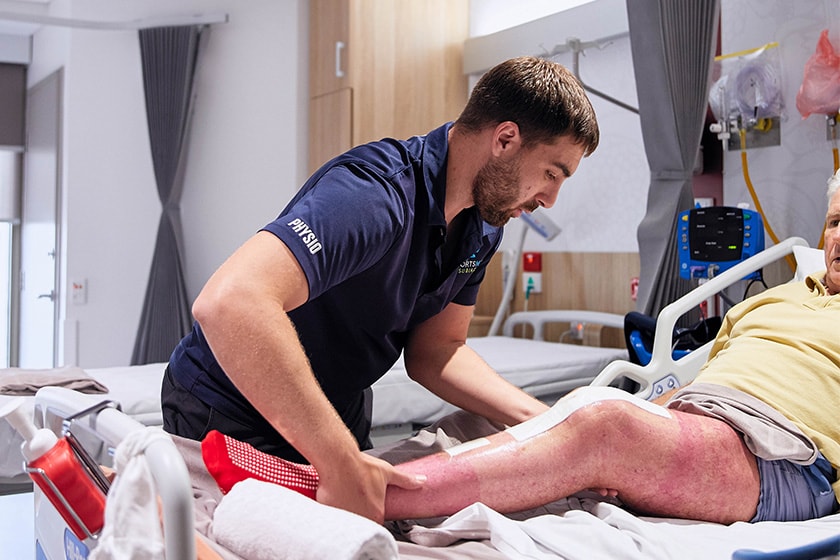Pain is a universal experience, one that can significantly impact our quality of life. Whether caused by an injury, a medical condition, or the wear and tear of daily life, living with pain can be physically and emotionally draining. Physiotherapy has a crucial role in pain management, both within the hospital or clinic setting and in the comfort of our homes. In this post we will explore the multi-faceted role of physiotherapy in managing pain, highlighting its benefits both in clinical environments and during at-home recovery.
Postoperative Pain Management
Physiotherapists play a pivotal role in the immediate postoperative period. Surgical procedures often leave patients with pain and limited mobility. Physiotherapists work closely with surgical teams to create personalised rehabilitation plans to assist in recovery from a wide variety of procedures. These plans often include exercises and specific techniques that help manage pain, prevent complications and accelerate the recovery process. By addressing pain early on, patients can regain their independence and mobility sooner.
Complex Medical Issues
Patients often experience pain due to their medical conditions or invasive procedures. Lack of mobility after a prolonged hospital admission can also make pre-existing pain much worse. Physiotherapists in the intensive care unit and the hospital wards collaborate with medical teams to administer pain-relief interventions tailored to the patient's needs. They employ various techniques, such as breathing exercises, gentle movements, and education to alleviate pain and improve patient comfort, even in the most challenging situations. They work in collaboration with the whole team including Doctors, Nurses and other Allied Health professionals such as Occupational Therapists and Social Workers.
Chronic Pain Management
Chronic pain conditions, such as arthritis and lower back pain, can be debilitating. Physiotherapy offers a non-invasive and holistic approach to managing these conditions. Through a combination of exercise, manual therapy and education, physiotherapists help individuals with chronic pain regain control of their lives. They focus on improving mobility, strength and activity modification which helps reduce pain and enhance overall well-being. Physiotherapists can also assist you with setting realistic goals and keeping you on track during your recovery.
Home-Based Care
Many patients continue their pain management journey at home, and physiotherapists are there to support them. Home-based physiotherapy programs are tailored to the patient's unique needs and living environment. Patients learn exercises and techniques that empower them to manage pain independently. This personalised approach not only reduces pain but also promotes self-confidence and long-term recovery.
Holistic Approach
What sets physiotherapy apart in pain management is its holistic approach. Instead of relying solely on medications, physiotherapists consider the individual's physical, psychological, and social well-being. They address other factors contributing to pain, rather than just symptoms. This comprehensive approach not only provides relief but also equips patients with the tools to prevent further pain and injuries. Physiotherapy is a dynamic and vital component of pain management, both within the hospital and beyond its walls. Whether you're recovering from surgery, a prolonged hospital stay, battling chronic pain, or seeking to regain mobility after an injury, physiotherapists are there to guide you on your journey.
Pain Management Tips
1. Stay Active - Gentle, regular physical activity can help reduce pain and improve overall function. Consult with a physiotherapist or healthcare provider to develop a safe exercise routine tailored to your condition.
2. Education - Good understanding of your condition and limitations can help you set realistic goals and feel empowered to manage your pain.
3. Heat and Cold Therapy - Applying heat or cold to the affected area can provide temporary pain relief. Ice packs can reduce inflammation, while warm compresses or hot packs can relax muscles and ease pain.
7. Massage and Manual Therapy - Massage therapy or hands on techniques performed by a trained physiotherapist can help alleviate pain cause by joint stiffness or muscle tension and also improve circulation.
4. Breathing Exercises - Deep, controlled breathing can help relax the body and reduce tension. It's particularly useful for managing pain associated with stress or anxiety.
5. Mindfulness and Relaxation - Practices like mindfulness, meditation, deep breathing or progressive muscle relaxation can help manage pain by reducing stress and promoting a sense of calm.
6. Physical Aids - Depending on your condition, using assistive devices like braces, walking aids, or ergonomic tools can reduce load and ease strain on painful areas.
7. Social Support - Share your pain experiences with trusted friends and family members. Emotional support can help you cope with the psychological aspects of pain.
8. Pain Journal - Keep a diary of your pain experiences. Note when pain is better or worse, what activities trigger or alleviate it, and how your emotional state affects it. This can provide insights into effective pain management strategies.
Remember that pain management is highly individualised. It may require some trial and error to find the strategies that work best for you. Always consult with your healthcare provider or a pain management specialist to develop a comprehensive pain management plan tailored to your specific needs and circumstances.


